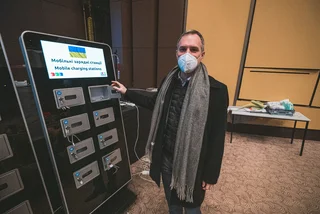15:15 Czech MPs pass bill simplifying documentation for refugees
The lower house of the Czech parliament passed a bill simplifying the procedure for granting residence permits to refugees from Ukraine. The process for refugees to obtain healthcare in the Czech Republic was also simplified. The bill arises from an agreement by EU interior ministers last week to introduce temporary protection for displaced people. It will be in effect from now until the end of the year if passed by the Senate on Wednesday.
14:51 Ukrainians will be able to work without work permits
The Czech the Chamber of Deputies has today passed a bill facilitating Ukrainian refugees' access to the labor market, under which they will be able to work without a work permit. Ukrainians will be also eligible for a humanitarian benefit of CZK 5,000 each, which may be issued repeatedly for those without work. Households accommodating refugees may also gain a financial contribution from the state.
13:00 Czechia terminates nuclear research cooperation with Russia
The Czech Republic is terminated a six-decade cooperation with Russian scientists at the Joint Institute for Nuclear Research in the Russian town of Dubna. The institute is one of the world's leading nuclear research centers, founding by eastern-bloc countries in 1956. Then-Czechoslovakia was one of the founding members of the center located near Moscow.
11:54 Door open to Ukraine EU membership, says Fiala
European Union leaders want to send a message to Ukraine that EU membership is open to the country and that the EU cares for Ukraine's future, Czech leader Petr Fiala said as the summit of EU leaders in Versailles, France, entered its second day. "We know that the path of a country to the European Union sometimes lasts years or even a decade, but we want to clearly show here: We want you," said Fiala.
10:54 Former Karlovy Vary Film Festival artistic director dies
Eva Zaoralová, longtime artistic director of the world-famous Karlovy Vary International Film Festival, died yesterday aged 89, a spokesperson for KVIFF announced today. As a film publicist, Zaoralová focused mostly on French and Italian cinema. She worked as a close aide to KVIFF director Jiří Bartoška in restoring the festival's international prestige from 1994 onwards, holding the post of artistic director until 2010 and staying involved as artistic adviser thereafter. Zaoralová is credited with playing a major role in turning KVIFF into one of the most prestigious events on the global cinema calendar.
Ukraine conflict EU summit underway to discuss further Russia sanctions
Presidents and Prime Ministers of EU member states are in France to discuss deepening sanctions on Russia following the country’s invasion of Ukraine. A joint statement released after the first day of talks did not, however, touch on Ukraine’s request for expedited accession to the EU, as this is a divisive issue among EU member states.
The summit at Versailles Castle continues today. On the issue of fast-tracked EU membership for Ukraine, some member states have even actively spoken out in opposition including Dutch PM Mark Rutte, who warned that “there is no such thing as a fast track.” The bloc’s leaders are expected to discuss further sanctions on Russia, with a separate declaration to pledge reduced dependency on Russian gas and increased defense spending.
S @EmmanuelMacron 🇫🇷 pic.twitter.com/h1Sz6Y8vfI
— Petr Fiala (@P_Fiala) March 10, 2022
Security Czech defense spending well below NATO requirement
The budget for the Czech Ministry of Defense will be CZK 89.1 billion this year, amounting to 1.35 percent of GDP. This is significantly below the 2 percent of GDP required by the NATO alliance for collective defense. The budget was increased by CZK 1 billion by special request of the government yesterday.
The defense budget has increased compared to that of a year ago, but its size as a proportion of GDP has decreased within wider cuts aimed at reducing the Czech Republic’s enormous state deficit. The new coalition government led by Petr Fiala has vowed to increase defense spending to 2 percent of GDP by 2025, the year of the next Czech election.
Economy Guarantee system for Sberbank kicks in
Komerční banka has so far processed 21,275 applications from Czech Sberbank clients, two days after the financial market’s guarantee system started paying deposit compensations to those affected by the revoking of the Russian bank’s license by the Czech National Bank following Russia’s invasion of Ukraine.
VAROVÃNÃ! Dnes si opÄ›t mohou klienti Sberbank vybÃrat penÃze a toho okamžitÄ› využili zlodÄ›ji.Okradli seniora, kterého si po výbÄ›ru v bance vytipovali a ten pak pÅ™iÅ¡el o znaÄnou Äástku penÄ›z. BuÄte prosÃm obezÅ™etnÃ, když u sebe máte vÄ›tÅ¡Ã obnos. https://t.co/74lUasSUPA #policiepha
— Policie ÄŒR (@PolicieCZ) March 9, 2022
Komerční banka has paid out compensations to the tune of almost CZK 10 billion, which amounts to around 40 percent of deposits. Applications for cash amount to CZK 275 million, leading police to warn those taking out large deposits to be wary of criminals. Around 106,000 clients will need to be compensated as a result of Sberbank’s disappearance from the market, with around CZK 24.2 billion to be paid out.
Cybersecurity Czech firm Avast stops operations in Russia
Czech antivirus provider Avast has stopped selling its products in Russia and Belarus as a result of the invasion of Ukraine. At the same time, the company will extend licenses for free paid products in Ukraine and provide other users in the country with the opportunity to obtain free versions of the company’s software.
Avast is one of the Czech Republic’s most successful tech companies and the second largest antivirus company in the world. It has been operating in Russia for almost 20 years. It has a considerable number of employees in both Russia and Ukraine, so the company said it is focusing on protecting all its staff to the best of its abilities, including by continuing to pay their full salaries.
In support of the Ukrainian people, Avast has suspended sales and marketing of our products in Russia and Belarus, and we are offering our premium products for free in Ukraine. Read more about our humanitarian efforts and employee support below. https://t.co/GbbT7UBm47
— Avast (@Avast) March 10, 2022
Refugees EU funds may help Czechia in refugee crisis
Funds from the European Union could be used to solve the crisis in tackling the inflow of Ukrainian refugees into the Czech regions. Regional Development Minister Ivan Bartoš discussed the use of EU funds, within the European Commission’s CARE (Cohesive Actions for Refugees in Europe) plan published on March 8.
Bartoš said Czechia is “intensively checking the possibility of using the proposal within our programs and opportunities for regions to use.” On the other hand, the long-term effects of using of EU funds to fix problems should also be considered, he said.












 Reading time: 4 minutes
Reading time: 4 minutes 





























